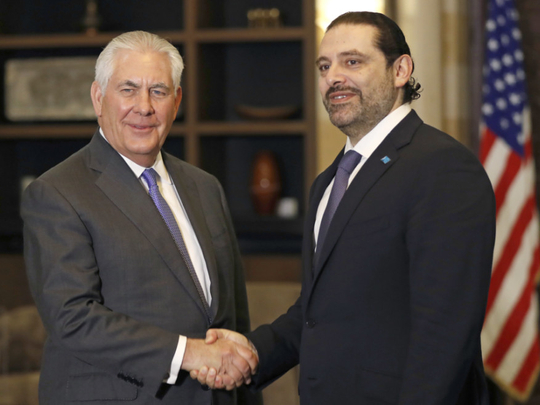
Beirut: US Secretary of State Rex Tillerson held talks with Prime Minister Sa’ad Hariri on Thursday in Beirut where he offered Washington’s support for a “free and democratic” Lebanon.
Tillerson’s visit, part of a tour of the Middle East, comes at a time of tension between Lebanon and neighbouring Israel, notably over the role of Lebanese Shiite movement Hezbollah.
The Iran-backed group, a member of Hariri’s government, is an arch-foe of Israel and branded a “terrorist” organisation by the United States.
It is a key ally of Syrian President Bashar Al Assad and has fighters on the ground in the war-torn country supporting the regime.
Hezbollah’s influence was at the heart of a political crisis in Lebanon over Hariri’s shock resignation announced from Saudi Arabia in November that was later rescinded.
“The United States stands with the Lebanese people for a free and democratic Lebanon,” Tillerson, the highest-ranking US official to visit the country in four years, wrote in the visitors’ book after talks with President Michel Aoun.
On Wednesday, speaking in Amman, Tillerson conceded that Hezbollah is part of the “political process” in Lebanon, appearing to soften Washington’s tone.
“We support a free, democratic Lebanon free of influence of others, and we know that Lebanese Hezbollah is influenced by Iran. This is influence that we think is unhelpful in Lebanon’s long-term future,” he said.
“We also have to acknowledge the reality that they also are part of the political process in Lebanon.”
Later, US Undersecretary of State Steve Goldstein said however that Lebanon “would be better off without Hezbollah’s terrorism and malign influence”.
After his talks in Beirut Tillerson was due to head to Turkey seeking to ease tensions with the NATO ally over Ankara’s ongoing operation against a US-backed Kurdish militia inside Syria.
Last week, a US envoy assured Lebanon that Israel does not seek an escalation between the countries following a surge in hostile rhetoric.
The neighbours have exchanged threats and condemnation over a border wall being constructed by Israel, a tender issued by Beirut for oil and gas exploration in disputed waters and arms flows to Lebanon’s Iran-backed Hezbollah group.
David Satterfield, acting assistant US secretary of state, was in Israel last week and in Lebanon this week on a mediation mission.
He assured the Lebanese that Israel does not want escalation.
Lebanon has described Israel’s border wall as an “aggression”, saying it intrudes into Lebanese territory.
Aoun meanwhile has been in talks with friendly states “to prevent Israeli greed” and has pledged to “confront any attack” on Lebanon’s territory or waters.
Israel is also peeved at Lebanon’s oil and gas exploration tender falsely claiming it falls within its waters.
Israel last went to war in Lebanon in 2006, against Hezbollah which, it says, has increased in strength since helping sway the Syrian civil war in President Bashar Al Assad’s favour.
Israeli and US officials have said they believe Iran is setting up factories in Lebanon to make precision-guided missiles that may allow Hezbollah to threaten Israel’s critical infrastructure in any future war.
Over the weekend the situation was enflamed after a Syrian anti-aircraft missile took down an Israeli fighter jet in Syrian territory.
Syria branded the Israeli air incursion as an act of aggression although Israel has carried out several strikes over the years on what they claim are weapons shipments to Hezbollah.











